Commercial waste disposal
Save money on your commercial waste disposal today
Just enter your business postcode…
Save money on your commercial waste disposal today
Just enter your business postcode…
Start saving now
While commercial waste collection is a familiar concept, delving into commercial waste disposal unveils a crucial and often overlooked phase in waste management. Beyond gathering waste, commercial waste disposal is the subsequent step in the process involving processing, treatment, recycling, or responsible disposal.
In this guide we cover:
Explore the different ways that commercial waste is disposed of at UK waste facilities.

At a commercial recycling facility, mixed recycling is sorted using human interventions or recycling technologies such as conveyor belts, screens, and magnets to separate the materials.
The materials then undergo a cleaning process. Paper and cardboard are often pulped and cleaned of contaminants, while metals are melted.
Paper and cardboard are usually processed into new paper, glass is melted and reshaped, and plastics are melted and remoulded into new products.
Visit our blog post on recycling processes for further details.

Waste items disposed of at landfills include non-recyclable plastics, mixed and contaminated materials, single-use items, coated paper and cardboard, as well as hazardous and clinical waste.
Once collected, the general business waste is sorted to ensure that nothing recyclable is inadvertently disposed of.
Landfills are meticulously maintained and carefully managed to capture the gases emitted as waste decomposes.
For more information, visit our blog on why are landfills bad for the environment.

Incineration is an alternative to landfills that extracts energy from difficult-to-recycle plastics, contaminated food waste, hazardous waste, medical waste, textiles, and treated wood.
Once the waste is collected, it undergoes pre-processing, which includes removing any items that could be recycled. The waste is then fed into incineration chambers, reaching temperatures of 800 – 1,200 degrees Celsius. This heat causes the waste to combust and turn to ash.
Most incinerators in the UK use the energy released from waste combustion to generate electricity.

Anaerobic digestion is a biological process used in commercial waste disposal to treat organic waste. It involves the breakdown of biodegradable materials by microorganisms without oxygen.
Food waste, agricultural residues, wastewater treatment sludge, garden waste, and paper pulp can be processed through anaerobic digestion.
The anaerobic digestion of waste produces biogas, primarily methane, and a nutrient-rich by product known as digestate.
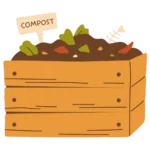
The types of waste that can be composted generally originate from the food and beverage sector include fruits, vegetables, coffee grounds and filters, eggshells, tea bags (if made from compostable material), shredded newspaper, kitchen paper towels, and various types of bread and grains (provided they are not contaminated with oils or dairy products).
Composting converts organic waste into compost, which is used in agriculture to improve the biological properties of soil.
Waste infrastructure in the UK is diverse, with specialist disposal and recycling facilities available only in certain locations. In this section, we’ll explore the commercial waste disposal facilities in some of the UK’s biggest cities.
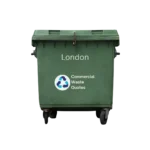
London is densely populated and has limited space, so waste and recycling collected in the city are usually transported out of London for disposal elsewhere. London’s roads are congested, so a large portion of waste disposal occurs by rail or using boats on the River Thames.
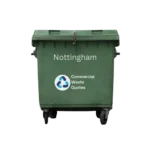
Commercial glass waste collected in Nottingham is disposed of at a glass cullet processing facility in Kirkby-in-Ashfield, a few miles north of the city. Recresco Glass Recycling operates Nottingham’s glass recycling facility.
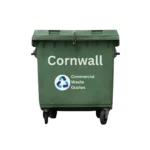
Commercial food waste collection in Cornwall is disposed of at an anaerobic digestion facility in the Cornish village of Fraddon. The facility converts organic waste from local businesses into compost and green biogas.
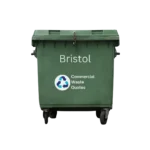
Clinical waste generated in Bristol is disposed of at a dedicated healthcare waste incinerator in Avonmouth. Incinerators safely dispose of sharps and other hospital waste that presents a biohazard risk.
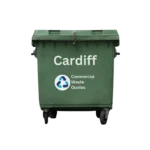
General business waste collected in Cardiff is disposed of at a landfill site in the nearby village of Newton on the banks of the Severn Estuary. Using local landfill sites reduces the carbon cost of transporting waste long distances.
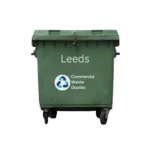
Veolia, a commercial waste disposal provider, operates a state-of-the-art recycling and energy recovery facility in Leeds. The site uses waste to generate enough electricity to power 22,000 local homes.
The commercial waste disposal needs of UK companies vary significantly from sector to sector. Here, our experts summarise the key waste disposal challenges for the UK’s most common small businesses:

Restaurants, pubs, and cafes generate food waste, packaging materials, and general business waste. Proper food waste disposal is a priority, and recycling efforts focus on glass and cardboard.

Healthcare institutions like GPs, hospitals, and dental practices generate clinical waste, including sharps, amalgam, and other biohazardous materials. Proper segregation and disposal processes are critical to maintaining a safe environment for patients.

School waste collection and university waste disposal are generated mostly by paper and stationery waste. Implementing recycling programmes for paper and cardboard recycling is common, involving separate bins, collections, and disposal for this waste type.

High street shops and supermarkets generate significant volumes of packaging materials from stock deliveries, including cardboard and plastic waste. Disposal and recycling of packaging waste can result in waste rebates.

Digital transformation is quickly reducing the volumes of waste produced by offices in the UK. However, secure data destruction and disposal of electronic and paper waste remain critical in the office environment to adhere to GDPR.

Events pose a significant waste disposal challenge as all waste collection and storage infrastructure needs to be temporarily installed at the event site. Visit our event waste management page for more information.
Our waste experts answer your commonly asked commercial waste disposal questions below.
There are many waste disposal regulations, which you can read in detail in our article commercial waste regulations.
All businesses have a duty of care over the waste they generate. Business owners can be convicted and jailed if found to be non-compliant.
A commercial waste disposal location will provide a signed waste transfer note, allowing your business to demonstrate compliance with waste regulations.
This depends on how much and quickly you fill up your commercial waste bins.
You can speak to one of our waste experts, who will happily discuss your needs and help determine how often you need a commercial waste collection.
Yes, commercial waste disposal varies by region for several reasons:
For more information, visit our commercial waste costs guide.
The government charges a tax on general waste disposed of by landfill that your provider will incur. The disposal of waste is also highly regulated. Your waste provider must maintain a registered waste carrier license and environmental permits at each of their waste disposal facilities.
For more information, please visit our full guide to the landfill tax.